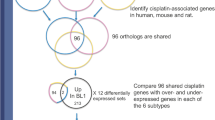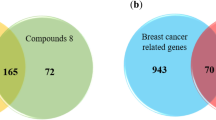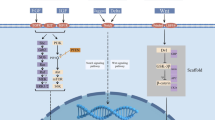Abstract
Current therapeutic approaches in malignancy are often based on combination therapies, reflecting present understanding of the way different players act together in cancer. The cooperative activity of several elements can potentiate the pro-metastatic functions of the cancer cells and of the tumor microenvironment (TME), together leading to a more aggressive disease phenotype. The design of improved therapeutic modalities requires better identification of networks that act at specific cancer-related settings, and of the molecular mechanisms involved. Such studies will indicate if therapies that co-target several factors or their receptors, simultaneously, could apply. Also, by delineating the intracellular pathways that are activated under such cooperative activities, it will be possible to determine whether to inhibit one specific molecular route that is shared by the different partners, or alternatively, design modalities that jointly target intracellular components acting in concert. This Focused Research Review illuminates the therapeutic relevance of this research field by describing our published findings in breast cancer-related publications, which identified networks that are established by the pro-inflammatory/pro-metastatic cytokine TNFα. It describes the additive/synergistic activities of TNFα with other soluble factors residing at the TME (e.g., IL-1β, TGFβ1, estrogen, EGF), with intracellular components such as the Ras oncogene, and with the tumor-stroma contexture through the activation of molecular cascades (Notch). The roles of the p65 (NF-κB) pathway—acting alone or in intricate relationships with other intracellular mechanisms—are described, the “TNFα-based network” is discussed as a general paradigm in malignancy and its clinical implications in cancer therapy are addressed.


Similar content being viewed by others
Abbreviations
- BC:
-
Breast cancer
- CAFs:
-
Cancer-associated fibroblasts
- CSCs:
-
Cancer stem cells
- EGF:
-
Epithelial growth factor
- EMT:
-
Epithelial-to-mesenchymal transition
- MSCs:
-
Mesenchymal stem cells
- PGE2:
-
Prostaglandin E2
- TGFβ:
-
Transforming growth factor β
- TME:
-
Tumor microenvironment
- TNBC:
-
Triple negative breast cancer
- TNFα:
-
Tumor necrosis factor α
References
Greten FR, Grivennikov SI (2019) Inflammation and cancer: triggers, mechanisms, and consequences. Immunity 51:27–41. https://doi.org/10.1016/j.immuni.2019.06.025
Maman S, Witz IP (2018) A history of exploring cancer in context. Nat Rev Cancer 18:359–376. https://doi.org/10.1038/s41568-018-0006-7
Aggarwal BB, Gupta SC, Kim JH (2012) Historical perspectives on tumor necrosis factor and its superfamily: 25 years later, a golden journey. Blood 119:651–665. https://doi.org/10.1182/blood-2011-04-325225
Waters JP, Pober JS, Bradley JR (2013) Tumour necrosis factor and cancer. J Pathol 230:241–248. https://doi.org/10.1002/path.4188
Balkwill F (2009) Tumour necrosis factor and cancer. Nat Rev Cancer 9:361–371. https://doi.org/10.1038/nrc2628
Colotta F, Allavena P, Sica A, Garlanda C, Mantovani A (2009) Cancer-related inflammation, the seventh hallmark of cancer: links to genetic instability. Carcinogenesis 30:1073–1081. https://doi.org/10.1093/carcin/bgp127
Pusztai L, Clover LM, Cooper K, Starkey PM, Lewis CE, McGee JO (1994) Expression of tumour necrosis factor alpha and its receptors in carcinoma of the breast. Br J Cancer 70:289–292
Garcia-Tunon I, Ricote M, Ruiz A, Fraile B, Paniagua R, Royuela M (2006) Role of tumor necrosis factor-alpha and its receptors in human benign breast lesions and tumors (in situ and infiltrative). Cancer Sci 97:1044–1049. https://doi.org/10.1111/j.1349-7006.2006.00277.x
Balkwill FR, Mantovani A (2012) Cancer-related inflammation: common themes and therapeutic opportunities. Semin Cancer Biol 22:33–40. https://doi.org/10.1016/j.semcancer.2011.12.005
Bussard KM, Mutkus L, Stumpf K, Gomez-Manzano C, Marini FC (2016) Tumor-associated stromal cells as key contributors to the tumor microenvironment. Breast Cancer Res 18:84. https://doi.org/10.1186/s13058-016-0740-2
Soria G, Ofri-Shahak M, Haas I et al (2011) Inflammatory mediators in breast cancer: coordinated expression of TNFalpha & IL-1beta with CCL2 & CCL5 and effects on epithelial-to-mesenchymal transition. BMC Cancer 11:130. https://doi.org/10.1186/1471-2407-11-130
Roebuck KA, Carpenter LR, Lakshminarayanan V, Page SM, Moy JN, Thomas LL (1999) Stimulus-specific regulation of chemokine expression involves differential activation of the redox-responsive transcription factors AP-1 and NF-kappaB. J Leukoc Biol 65:291–298
Leibovich-Rivkin T, Liubomirski Y, Bernstein B, Meshel T, Ben-Baruch A (2013) Inflammatory factors of the tumor microenvironment induce plasticity in nontransformed breast epithelial cells: EMT, invasion, and collapse of normally organized breast textures. Neoplasia 15:1330–1346. https://doi.org/10.1593/neo.131688
Weitzenfeld P, Meron N, Leibovich-Rivkin T, Meshel T, Ben-Baruch A (2013) Progression of luminal breast tumors is promoted by menage a trois between the inflammatory cytokine TNFalpha and the hormonal and growth-supporting arms of the tumor microenvironment. Mediat Inflamm 2013:720536. https://doi.org/10.1155/2013/720536
Leibovich-Rivkin T, Liubomirski Y, Meshel T, Abashidze A, Brisker D, Solomon H, Rotter V, Weil M, Ben-Baruch A (2014) The inflammatory cytokine TNFalpha cooperates with Ras in elevating metastasis and turns WT-Ras to a tumor-promoting entity in MCF-7 cells. BMC Cancer 14:158. https://doi.org/10.1186/1471-2407-14-158
Lerrer S, Liubomirski Y, Bott A et al (2017) Co-inflammatory roles of TGFbeta1 in the presence of TNFalpha drive a pro-inflammatory fate in mesenchymal stem cells. Front Immunol 8:479. https://doi.org/10.3389/fimmu.2017.00479
Liubomirski Y, Lerrer S, Meshel T, Rubinstein-Achiasaf L, Morein D, Wiemann S, Korner C, Ben-Baruch A (2019) Tumor-stroma-inflammation networks promote pro-metastatic chemokines and aggressiveness characteristics in triple-negative breast cancer. Front Immunol 10:757. https://doi.org/10.3389/fimmu.2019.00757
Liubomirski Y, Lerrer S, Meshel T et al (2019) Notch-mediated tumor-stroma-inflammation networks promote invasive properties and CXCL8 expression in triple-negative breast cancer. Front Immunol 10:804. https://doi.org/10.3389/fimmu.2019.00804
Alfaro C, Sanmamed MF, Rodriguez-Ruiz ME et al (2017) Interleukin-8 in cancer pathogenesis, treatment and follow-up. Cancer Treat Rev 60:24–31. https://doi.org/10.1016/j.ctrv.2017.08.004
Lim SY, Yuzhalin AE, Gordon-Weeks AN, Muschel RJ (2016) Targeting the CCL2-CCR2 signaling axis in cancer metastasis. Oncotarget 7:28697–28710. https://doi.org/10.18632/oncotarget.7376
Aldinucci D, Colombatti A (2014) The inflammatory chemokine CCL5 and cancer progression. Mediat Inflamm 2014:292376. https://doi.org/10.1155/2014/292376
Sedger LM, McDermott MF (2014) TNF and TNF-receptors: from mediators of cell death and inflammation to therapeutic giants - past, present and future. Cytokine Growth Factor Rev 25:453–472. https://doi.org/10.1016/j.cytogfr.2014.07.016
Al-Hatamleh MAI, Ahmad S, Boer JC, Lim J, Chen X, Plebanski M, Mohamud R (2019) A perspective review on the role of nanomedicine in the modulation of TNF-TNFR2 axis in breast cancer immunotherapy. J Oncol 2019:6313242. https://doi.org/10.1155/2019/6313242
Ben-Baruch A (2012) The tumor-promoting flow of cells into, within and out of the tumor site: regulation by the inflammatory axis of TNFalpha and chemokines. Cancer Microenviron 5:151–164. https://doi.org/10.1007/s12307-011-0094-3
Hamaguchi T, Wakabayashi H, Matsumine A, Sudo A, Uchida A (2011) TNF inhibitor suppresses bone metastasis in a breast cancer cell line. Biochem Biophys Res Commun 407:525–530. https://doi.org/10.1016/j.bbrc.2011.03.051
Warren MA, Shoemaker SF, Shealy DJ, Bshar W, Ip MM (2009) Tumor necrosis factor deficiency inhibits mammary tumorigenesis and a tumor necrosis factor neutralizing antibody decreases mammary tumor growth in neu/erbB2 transgenic mice. Mol Cancer Ther 8:2655–2663. https://doi.org/10.1158/1535-7163.mct-09-0358
Yu M, Zhou X, Niu L et al (2013) Targeting transmembrane TNF-alpha suppresses breast cancer growth. Cancer Res 73:4061–4074. https://doi.org/10.1158/0008-5472.CAN-12-3946
Rubio MF, Werbajh S, Cafferata EG, Quaglino A, Colo GP, Nojek IM, Kordon EC, Nahmod VE, Costas MA (2006) TNF-alpha enhances estrogen-induced cell proliferation of estrogen-dependent breast tumor cells through a complex containing nuclear factor-kappa B. Oncogene 25:1367–1377. https://doi.org/10.1038/sj.onc.1209176
Rivas MA, Tkach M, Beguelin W, Proietti CJ, Rosemblit C, Charreau EH, Elizalde PV, Schillaci R (2009) Transactivation of ErbB-2 induced by tumor necrosis factor alpha promotes NF-kappaB activation and breast cancer cell proliferation. Breast Cancer Res Treat 122:111–124. https://doi.org/10.1007/s10549-009-0546-3
Qiao Y, He H, Jonsson P, Sinha I, Zhao C, Dahlman-Wright K (2016) AP-1 is a key regulator of proinflammatory cytokine TNFalpha-mediated triple-negative breast cancer progression. J Biol Chem 291:5068–5079. https://doi.org/10.1074/jbc.M115.702571
Eroles P, Bosch A, Perez-Fidalgo JA, Lluch A (2012) Molecular biology in breast cancer: intrinsic subtypes and signaling pathways. Cancer Treat Rev 38:698–707. https://doi.org/10.1016/j.ctrv.2011.11.005
Jiang X, Shapiro DJ (2014) The immune system and inflammation in breast cancer. Mol Cell Endocrinol 382:673–682. https://doi.org/10.1016/j.mce.2013.06.003
Mantovani A, Barajon I, Garlanda C (2018) IL-1 and IL-1 regulatory pathways in cancer progression and therapy. Immunol Rev 281:57–61. https://doi.org/10.1111/imr.12614
Miles DW, Happerfield LC, Naylor MS, Bobrow LG, Rubens RD, Balkwill FR (1994) Expression of tumour necrosis factor (TNF alpha) and its receptors in benign and malignant breast tissue. Int J Cancer 56:777–782
Deblois G, Giguere V (2013) Oestrogen-related receptors in breast cancer: control of cellular metabolism and beyond. Nat Rev Cancer 13:27–36. https://doi.org/10.1038/nrc3396
Weitzenfeld P, Kossover O, Korner C, Meshel T, Wiemann S, Seliktar D, Legler DF, Ben-Baruch A (2016) Chemokine axes in breast cancer: factors of the tumor microenvironment reshape the CCR7-driven metastatic spread of luminal-A breast tumors. J Leukoc Biol 99:1009–1025. https://doi.org/10.1189/jlb.3MA0815-373R
Weitzenfeld P, Meshel T, Ben-Baruch A (2016) Microenvironmental networks promote tumor heterogeneity and enrich for metastatic cancer stem-like cells in Luminal-A breast tumor cells. Oncotarget 7:81123–81143. https://doi.org/10.18632/oncotarget.13213
Sihto H, Lundin J, Lundin M et al (2011) Breast cancer biological subtypes and protein expression predict for the preferential distant metastasis sites: a nationwide cohort study. Breast Cancer Res 13:R87. https://doi.org/10.1186/bcr2944
Kalluri R (2016) The biology and function of fibroblasts in cancer. Nat Rev Cancer 16:582–598. https://doi.org/10.1038/nrc.2016.73
Cuiffo BG, Karnoub AE (2012) Mesenchymal stem cells in tumor development: emerging roles and concepts. Cell Adh Migr 6:220–230. https://doi.org/10.4161/cam.20875
Goldstein RH, Reagan MR, Anderson K, Kaplan DL, Rosenblatt M (2010) Human bone marrow-derived MSCs can home to orthotopic breast cancer tumors and promote bone metastasis. Cancer Res 70:10044–10050. https://doi.org/10.1158/0008-5472.CAN-10-1254
Karnoub AE, Dash AB, Vo AP et al (2007) Mesenchymal stem cells within tumour stroma promote breast cancer metastasis. Nature 449:557–563. https://doi.org/10.1038/nature06188
Batlle E, Massague J (2019) Transforming growth factor-beta signaling in immunity and cancer. Immunity 50:924–940. https://doi.org/10.1016/j.immuni.2019.03.024
Umamaheswaran S, Dasari SK, Yang P, Lutgendorf SK, Sood AK (2018) Stress, inflammation, and eicosanoids: an emerging perspective. Cancer Metastasis Rev 37:203–211. https://doi.org/10.1007/s10555-018-9741-1
Lamy M, Ferreira A, Dias JS, Braga S, Silva G, Barbas A (2017) Notch-out for breast cancer therapies. N Biotechnol 39:215–221. https://doi.org/10.1016/j.nbt.2017.08.004
Katanov C, Lerrer S, Liubomirski Y et al (2015) Regulation of the inflammatory profile of stromal cells in human breast cancer: prominent roles for TNF-alpha and the NF-kappaB pathway. Stem Cell Res Ther 6:87. https://doi.org/10.1186/s13287-015-0080-7
Li R, Hebert JD, Lee TA, Xing H, Boussommier-Calleja A, Hynes RO, Lauffenburger DA, Kamm RD (2017) Macrophage-secreted TNFalpha and TGFbeta1 influence migration speed and persistence of cancer cells in 3D tissue culture via independent pathways. Cancer Res 77:279–290. https://doi.org/10.1158/0008-5472.CAN-16-0442
Jing Y, Han Z, Liu Y et al (2012) Mesenchymal stem cells in inflammation microenvironment accelerates hepatocellular carcinoma metastasis by inducing epithelial-mesenchymal transition. PLoS One 7:e43272. https://doi.org/10.1371/journal.pone.0043272
Liu Y, Han ZP, Zhang SS et al (2011) Effects of inflammatory factors on mesenchymal stem cells and their role in the promotion of tumor angiogenesis in colon cancer. J Biol Chem 286:25007–25015. https://doi.org/10.1074/jbc.M110.213108
Ren G, Zhang L, Zhao X, Xu G, Zhang Y, Roberts AI, Zhao RC, Shi Y (2008) Mesenchymal stem cell-mediated immunosuppression occurs via concerted action of chemokines and nitric oxide. Cell Stem Cell 2:141–150. https://doi.org/10.1016/j.stem.2007.11.014
De Marco P, Lappano R, De Francesco EM et al (2016) GPER signalling in both cancer-associated fibroblasts and breast cancer cells mediates a feedforward IL1beta/IL1R1 response. Sci Rep 6:24354. https://doi.org/10.1038/srep24354
Schauer IG, Zhang J, Xing Z, Guo X, Mercado-Uribe I, Sood AK, Huang P, Liu J (2013) Interleukin-1beta promotes ovarian tumorigenesis through a p53/NF-kappaB-mediated inflammatory response in stromal fibroblasts. Neoplasia 15:409–420. https://doi.org/10.1593/neo.121228
Li HJ, Reinhardt F, Herschman HR, Weinberg RA (2012) Cancer-stimulated mesenchymal stem cells create a carcinoma stem cell niche via prostaglandin E2 signaling. Cancer Discov 2:840–855. https://doi.org/10.1158/2159-8290.cd-12-0101
Acknowledgements
The author thanks all members of her group and all collaborators who contributed to the findings described in this review.
Funding
The respective funding sources are acknowledged in the papers of the Ben-Baruch research group which are cited in this review.
Author information
Authors and Affiliations
Corresponding author
Ethics declarations
Conflict of interest
The author declares no conflict of interest.
Ethical approval
Not applicable.
Additional information
Publisher's Note
Springer Nature remains neutral with regard to jurisdictional claims in published maps and institutional affiliations.
This paper is a Focused Research Review based on a presentation given at the Sixth International Conference on Cancer Immunotherapy and Immunomonitoring (CITIM 2019), held in Tbilisi, Georgia, 29th April–2nd May 2019. It is part of a series of CITIM 2019 papers in Cancer Immunology, Immunotherapy.
Rights and permissions
About this article
Cite this article
Ben-Baruch, A. Partners in crime: TNFα-based networks promoting cancer progression. Cancer Immunol Immunother 69, 263–273 (2020). https://doi.org/10.1007/s00262-019-02435-4
Received:
Accepted:
Published:
Issue Date:
DOI: https://doi.org/10.1007/s00262-019-02435-4




